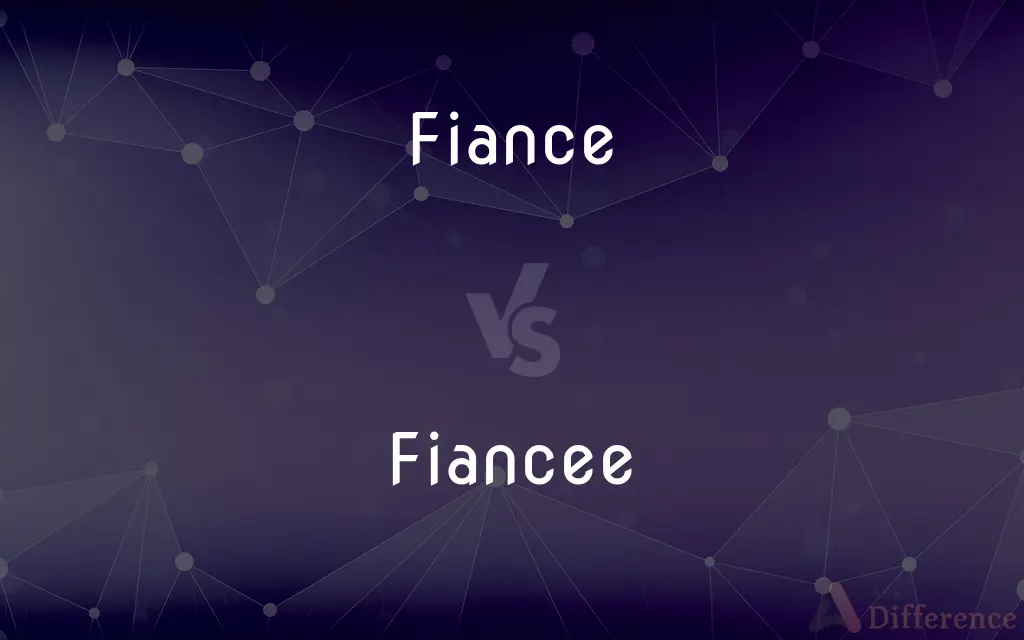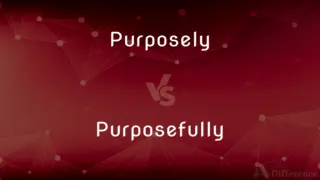Fiance vs. Fiancee — What's the Difference?
By Tayyaba Rehman — Updated on October 13, 2023
"Fiance" is a man engaged to be married, while "Fiancee" is a woman engaged to be married.

Difference Between Fiance and Fiancee
Table of Contents
ADVERTISEMENT
Key Differences
"Fiance" and "Fiancee" are terms borrowed from the French language, illustrating the gender distinction in nouns. While "Fiance" denotes an engaged man, "Fiancee" specifically refers to an engaged woman.
Traditionally, languages like French had gender-specific terms for many roles and relationships. The distinction between "Fiance" and "Fiancee" preserves this gender-specificity in English, ensuring clarity in conversations about engagements.
Some might wonder why two terms exist when the word "partner" can be gender-neutral. However, "Fiance" and "Fiancee" offer precision, revealing not just the relationship but also the gender of the engaged person.
In contemporary times, as discussions about gender evolve, some people opt for gender-neutral terms. Still, "Fiance" and "Fiancee" remain widely used, particularly in formal and traditional contexts.
It's crucial to use these terms correctly to convey information accurately. Misusing "Fiance" for a woman or "Fiancee" for a man can lead to confusion, emphasizing the importance of understanding the distinction.
ADVERTISEMENT
Comparison Chart
Gender
Male
Female
Origin
Derived from French
Derived from French
Endings
Ends with a single 'e'
Ends with double 'ee'
Usage
Refers to an engaged man
Refers to an engaged woman
Pronunciation
Typically pronounced as "fee-ahn-SAY"
Commonly pronounced as "fee-ahn-SAY" but with emphasis on the last syllable
Compare with Definitions
Fiance
Fiance is a man who is engaged to be married.
My fiance and I are planning a summer wedding.
Fiancee
Fiancee is a woman who is engaged to be married.
His fiancee has a beautiful engagement ring.
Fiance
Fiance is the term for a man who has promised to marry.
Her fiance proposed during their vacation in Italy.
Fiancee
Fiancee denotes a bride-to-be before the wedding.
The groom and his fiancee are taking dance lessons for the big day.
Fiance
Fiance represents a male partner in an engagement.
She introduced her fiance to her family last night.
Fiancee
Fiancee is the term for a woman who has promised to marry.
The engagement party was thrown in honor of the fiancee.
Fiance
Fiance is the masculine counterpart of fiancee in engagement context.
Everyone was eager to meet her new fiance at the party.
Fiancee
Fiancee represents a female partner in an engagement.
He was thrilled when his fiancee accepted the proposal.
Fiance
Fiance denotes a groom-to-be before the wedding.
The bride and her fiance chose a beach theme for their wedding.
Fiancee
Fiancee is the feminine counterpart of fiance in engagement context.
The entire town was buzzing with news of the mayor's fiancee.
Fiance
A man to whom one is engaged to be married.
Fiancee
A woman to whom someone is engaged to be married
He went back to the valley to marry his fiancée
Fiance
Alternative spelling of fiancé
Fiancee
A woman to whom one is engaged to be married.
Fiance
(obsolete) To betroth; to affiance.
Fiancee
A betrothed woman.
Fiance
To betroth; to affiance.
Fiancee
A woman who is engaged to be married
Fiance
A betrothed man.
Fiance
A man who is engaged to be married
Common Curiosities
And what does Fiancee represent?
Fiancee represents a woman who is engaged to be married.
Is the pronunciation of Fiance and Fiancee different?
Yes, while both can be pronounced as "fee-ahn-SAY," there's often an emphasis on the last syllable for "Fiancee."
How do I remember the difference between the two?
Fiancee, with an extra 'e,' is for females.
In which contexts are these terms most commonly used?
Fiance and Fiancee are primarily used in the context of engagements and wedding preparations.
Do all languages have gender distinctions like Fiance and Fiancee?
Not all, but many languages, especially Romance languages, have gender distinctions in nouns.
What does Fiance indicate in relationship terms?
Fiance indicates a man who is engaged to be married.
Can the terms be used interchangeably?
No, Fiance is for men and Fiancee is for women. Using them interchangeably can lead to confusion.
How long has English been using these terms?
English borrowed Fiance and Fiancee from French in the 19th century.
How are the terms evolving in modern times?
While Fiance and Fiancee remain popular, some people prefer gender-neutral terms in the wake of evolving gender discussions.
Can Fiance and Fiancee be used for same-sex couples?
Yes, the gender of the term should match the individual, regardless of the gender of their partner.
Are Fiance and Fiancee derived from French?
Yes, both terms are borrowed from the French language, preserving the gender distinction.
Do these terms have any legal implications?
In some contexts, being recognized as a fiance or fiancee might have immigration or other legal implications.
Are there any cultural variations in the use of Fiance and Fiancee?
While the meanings remain consistent, cultural practices around engagements and weddings can vary widely.
Are there gender-neutral alternatives?
Yes, terms like "partner" or "betrothed" can be gender-neutral.
Why are there two separate terms for men and women?
The distinction offers precision in communication, revealing both the relationship and the gender.
Share Your Discovery

Previous Comparison
Purposely vs. Purposefully
Next Comparison
Break vs. BrakeAuthor Spotlight
Written by
Tayyaba RehmanTayyaba Rehman is a distinguished writer, currently serving as a primary contributor to askdifference.com. As a researcher in semantics and etymology, Tayyaba's passion for the complexity of languages and their distinctions has found a perfect home on the platform. Tayyaba delves into the intricacies of language, distinguishing between commonly confused words and phrases, thereby providing clarity for readers worldwide.
















































